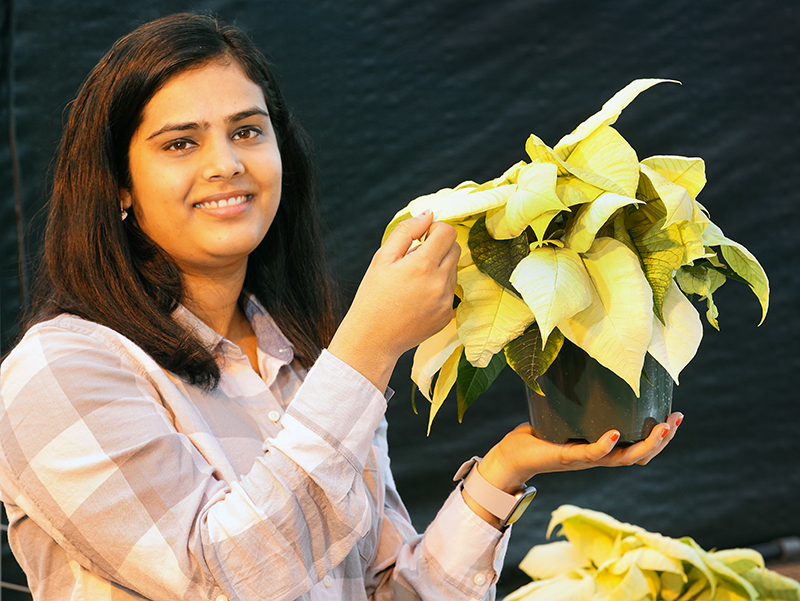The student
While Ranjeeta Adhikari was growing up in Nepal, she helped her mother care for the family’s huge kitchen garden. Tending the plants, Adhikari says, “built up an interest and passion for agriculture,” which she studied as an undergraduate at Nepal’s Tribhuvan University. She then earned a scholarship from the Indian government to complete a master’s degree in horticulture at Dr. Balasaheb Sawant Konkan Krishi Vidhyapeeth (BSKKV), an agricultural university in the Indian state of Maharashtra. Adhikari worked as a project officer for a community development NGO in Nepal before coming to the United States in 2016 with her husband, who was enrolled in a Purdue doctoral program. As she explored PhD programs for herself, she became interested in the work of Purdue researcher Krishna Nemali, assistant professor of controlled environment agriculture. Nemali focuses on vegetables and ornamentals grown in greenhouses and vertical farms using hydroponic production systems. “I applied and was offered a research assistantship for the PhD degree,” Adhikari says. She began her program in June 2017 under Nemali’s guidance and will graduate this semester.
The research
Adhikari’s research has two main components: developing and optimizing smart sensors to assess nitrogen in plants; and understanding plant responses to nitrogen supply and optimization at cellular, physiological, and whole-plant scales. Plant nitrogen is important in determining the growth and quality of ornamental plants, she explains, “but indoor growers have limited options for simple, reliable and affordable technology to measure it.” Using crucial data that Adhikari generated, the Nemali lab has developed affordable smart sensors that use images collected on a smartphone to analyze plant traits, including plant nitrogen status. “It will mainly help the growers,” she says. Her work earned an award from the American Floral Endowment in 2020 for outstanding research and extension in the floriculture sector.
Opportunities
In addition to being a “great mentor,” Adhikari credits Nemali’s involvement in Extension with giving her opportunities to speak at seminars and interact with growers to improve her communication and leadership skills. She was a teaching assistant twice, led her department’s graduate student organization, and contributed to academic and Extension publications. As past president of the Nepali Society at Purdue, she also was involved in social and fundraising activities in collaboration with the International Student Center.
Future plans
Adhikari plans to stay in the U.S. for the short term and continue working in controlled environment agriculture and crop physiology. “I’m determined to develop my career as a researcher in the greenhouse industry and focus on optimizing resources for sustainable and quality crop production,” she says. She also is interested in continuing her Extension activities related to production quality. Outside of the lab, Adhikari enjoys watching television and reading fiction, and “I love traveling new places and learning new things,” she says. The pandemic delayed a planned trip home to Nepal in 2020, but she will return to see family as soon as circumstances permit.
